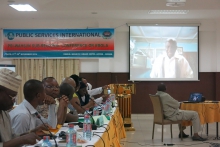PSI Africa region health sector trade unions call for new public healthcare systems in response to Ebola crisis

Trade unions representing health sector workers from across West Africa and the broader region have reported extremely poor levels of preparedness in case Ebola Virus Disease (EVD) were to spread beyond the current major outbreak countries. Furthermore, in the major outbreak countries – Guinea, Liberia and Sierra Leone – workers involved in the fight to contain EVD and save lives continue to die at unacceptably high levels.
These were some of the findings at the “Safe workers save lives” regional conference on EVD and health sector workers conducted by Public Services International (PSI) and the West African Health Sector Unions Network (WAHSUN) in Accra, Ghana on 27-28 November 2014. This was the first international trade union conference to be held on EVD.
Peters Adeyemi, PSI Co-Vice President for Africa and the Arab Countries, opened the conference with a call to remembering the more than 350 health sector workers who have died to date in fighting the disease.
Ansu Rashid Kallon, General Secretary of the PSI-affiliated Sierra Leone Health Service Workers Union, reported to the conference live via the internet: “our society is in complete crisis – it is not just that there is not enough services to treat those with EVD – normal medical services have completely stopped since the only people who can go to a hospital are those with EVD. There is a shortage of everything: personal protective equipment (PPE), transport, food, fuel.” More than 170 health workers have died in Sierra Leone since the start of the Ebola outbreak.
Ayuba Wabba, President of the Nigerian Medical and Health Workers Union and WAHSUN, “we need strong public health systems in place. Too many of the critical elements of the health system have been outsourced. You cannot outsource disease control.”
Comrade Wabba also noted that the containment of EVD in Nigeria was possible because of a number of factors. But it was noteworthy that when Nigeria’s first case was detected in late July, local unions had already started agitating since the beginning of the month amongst members and the general public on the issue of preparedness. Moreover, this agitation gave impetus to the government which immediately mobilised significant public health resources and containment measures.
During the conference, in a survey of health sector unions from 14 countries across West and Central Africa*, all reported problems of inadequate access to PPE in general and inadequate staffing and training in their health systems. More than half reported that unions have been excluded from national EVD planning processes.
David Dorkenoo, PSI regional secretary for Africa and the Arab countries, noted: “where unions are excluded from national EVD preparedness strategies we see weaker responses and poorer outcomes. Health sector unions represent the workers at the frontline of epidemic preparedness – they know what is necessary to do the job properly to save lives, what they need is the right working conditions with access to all necessary resources. This can only be done where there is a strong, robust public health care system.”
Unions at the meeting endorsed the PSI EVD Trade Union Intervention Strategy and supported the development of national action plans which would focus on improving working conditions and training in the health sector and promoting the expansion and development of public health care systems across the region. Unions also called on PSI and WAHSUN to take the lead in lobbying global and regional organisations in the interests of health sector workers.
PSI Co-Vice President for Africa and the Arab Countries, Thandeka Ritta Msibi, ended the meeting by thanking all the participants and recalling that, “health is not a commodity, it is not a privilege, it is a right for all to be achieved through a universally accessible public health care system.”
The PSI-WAHSUN regional conference was made possible through the support of PSI affiliated unions in Ghana (HSWU and GRNA), Finland (JHL and TEHY) and the Netherlands (AbvaKabo), and the solidarity support organisations FNV Mondiaal (Netherlands) and SASK (Finland).
* Benin, Burkina Faso, Cameroun, Côte d'Ivoire, Ghana, Guinea, Liberia, Mali, Niger, Nigeria, democratic Republic of Congo, Senegal, Sierra Leone and Togo

